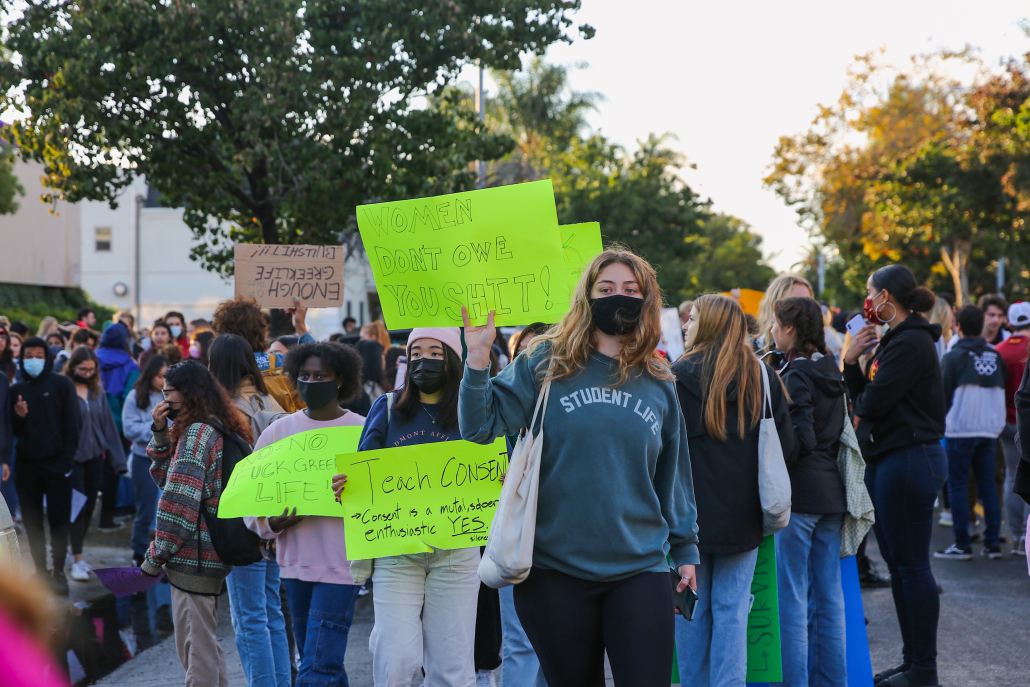Carol Folt addresses criticisms in communitywide email Monday

Content warning: This article contains references to sexual assault and violence.
President Carol Folt addressed the information delay in the recent sexual assault and drugging reports, the Varsity Blues scandal, the consulting firm McKinsey & Company’s role in USC’s Culture Journey and the George Tyndall sexual abuse case in a campuswide email Monday that included a link to Frequently Asked Questions.
The letter comes five days after professor of law and history Ariela Gross published an op-ed in the Los Angeles Times titled “As a USC professor, I can’t stay quiet about the administration’s toxic culture” that criticized the University’s administration and its handling of multiple scandals throughout the past few years through the recent sexual assault reports at Sigma Nu Fraternity.
The FAQs addressed many of the concerns Gross raised in her op-ed, including the delay in information reported about the Sept. 30 sexual assault and drugging reports at the Sigma Nu Fraternity house. Since information received by Relationship & Sexual Violence Prevention Services is confidential, the Department of Public Safety was “uncertain” how to address the information, according to the FAQs.
The University scheduled a meeting to determine next steps on Oct. 18., and on Oct. 16, a student reported being sexually assaulted by a member of the same fraternity.
The questions addressed the administration’s information sharing policies regarding ongoing developments in the Varsity Blues scandal. Most recently, former USC Athletic Director Official Donna Heinel pleaded guilty to her role in helping students’s admission to the University by inaccurately portraying them as athletes.
The University said they took “detailed steps” to “safeguard the integrity of the athletic admissions process,” including reviewing student-athlete’s files on three levels and USC head coach certification that students are being recruited for their athletic abilities and roster audits.
In 2019, the University sent out FAQs regarding the Varsity Blues scandal, including that they were cooperating with investigations, held those involved accountable and implemented the changes mentioned in Monday’s FAQs.
The questions also addressed the former Dean of the Suzanne Dworak-Peck School of Social Work Marilyn Louise Flynn’s recent indictment — which Gross mentioned in her op-ed — that alleges she was involved in a bribery scheme with Los Angeles city councilmember Mark Ridley-Thomas, writing that the University has cooperated with the investigation since learning of it in 2018.
In her op-ed, Gross criticized the McKinsey consulting firm’s alleged involvement in shaping USC’s Culture Journey, noting McKinsey’s contribution to the opioid crisis and immigrant detention facilities which was denied by USC in their FAQs.
Regarding concerns about USC’s handling of the George Tyndall sexual abuse case, the University said it is cooperating with its obligations regarding the class action settlement.
The University also said it is complying with the “resolution agreement with the Office for Civil Rights, including providing ongoing information to OCR as required by the resolution agreement.”
The University has expanded RSVP services, hired more female physicians and “[implemented] a university-wide Clery Act Policy and Interdisciplinary Review Team,” according to the questions.
However, the FAQs did not directly address Gross’ statement that USC has not released reports about Tyndall or former medical school dean Dr. Carmen Puliafito.
During a “Save our Students” protest last Friday, faculty chanted “Let’s see the reports,” referencing Tyndall’s and Puliafito’s, outside of Bovard, and multiple professors expressed long term concerns about USC’s handling of sexual abuse.
The questions also addressed Provost Charles Zukoski’s email last week in which he wrote that there are many organizations on campus that use Greek letters and that it is “critical not to make assumptions or target any particular groups or individuals simply because they live in the same area or residence where events may have occurred.”
The University wrote on the website that many students living near the Row reported harassment, targeting and “being treated insensitively by some faculty members” following the sexual assault reports.
The answer referred students to additional statements in Zukoski’s letter that sexual assault is “abhorrent” and a systemic problem within society.
In the communitywide email, Folt cited the University’s Zoom town hall Wednesday as further evidence of the administration’s transparency, where USC officials such as Folt, Zukoski, DPS Chief Thomas and Chief Health Officer Dr. Sarah Van Orman discussed the University’s response to the sexual assault reports.
However, students and the Undergraduate Student Government criticized the administration last week for canceling the planned in-person town hall with various student organizations on the day that it was supposed to take place, instead opting for the Zoom format.

